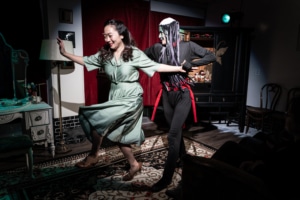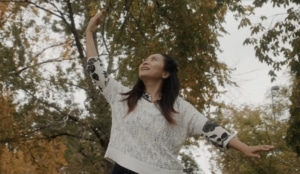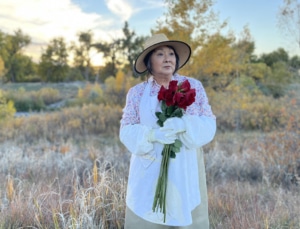DCPA NEWS CENTER
Enjoy the best stories and perspectives from the theatre world today.
Enjoy the best stories and perspectives from the theatre world today.

Joyce Yuriko Cole. Nicholas Caputo
One hundred and twenty five miles east of Pueblo, Colorado is the small town of Granada. Situated along Highway 50 a mere 15 miles from the Kansas border, this dwindling town of 445 is fairly unremarkable save for the dubious part it played in World War II as the site of the Granada War Relocation Center — otherwise known as Camp Amache to the 7,000+ Japanese Americans who were forcibly imprisoned there.
Colorado played a part in this dark moment in American history…a history that is being revisited in the third encore production of ZOTTO – A Supernatural Folktale, an immersive play presented by the Japanese Arts Network.
“ZOTTO is an immersive supernatural Japanese folktale,” explained Courtney Ozaki, playwright and Founder/Creative Producer of the Japanese Arts Network. “It’s a story of three generations of Japanese women in Colorado: a first generation Japanese woman, a third generation (her granddaughter), and then the great granddaughter. It takes you through this journey of learning about…the incarceration experience during World War II as well as the effects of life afterwards.
Considered one of the most atrocious violations of civil rights in American history, President Franklin D. Roosevelt’s Executive Order 9066 required that all people of Japanese descent — including US-born citizens — be incarcerated from 1942 to 1945 in response to the attack on Pearl Harbor and America’s entry into World War II.
Including Ozaki’s grandparents.

Min Kyung (Cecilia) Kim, Tiffany Ogburn. ZOTTO. Martha Wirth Photography
Her father’s parents had settled in Peru where her grandfather owned a grocery store. Shortly after the US enacted the order, other countries including Canada, Mexico, Brazil, Argentina and Peru followed suit, forcibly relocating individuals from their homes to internment camps in the US. After the war, her grandparents were not allowed to return to Peru and didn’t want to go to Japan, “so in order to stay in the United States, especially because they had two American citizen children, they had to find a sponsor…and they found a distant cousin in Denver in Five Points,” where her grandfather opened a grocery store and they rebuilt their lives.
Ozaki’s maternal grandparents had a similar experience. Despite being born in California, her Grandmother Rose was relocated to an internment camp in Arizona where she met her future husband, also American.
“I had my grandmother really closely in mind throughout the story,” she explained. While Rose wasn’t able to share all of those painful experiences, she did share some glimpses with Ozaki. In one incident, “they were taken to the race track and they had to clean out the horse stall so they could stay in it. I was just completely taken aback and in disbelief when she told me that,” described Ozaki.
She combined the stories of her grandparents with others to weave together a narrative that both enlightens audiences about what happened and highlights their survival.

MinKyung (Cecilia) Kim. Zotto 2022. Bruce Tetsuya
“We incorporated the story of the Amache rose, which is a rose bush that was planted at [the Colorado internment camp],” she went on. Growing in near desert conditions, the roses bloomed under the care of those who were imprisoned there then went dormant for nearly 80 years. Surprisingly, the roses were revived and “bloomed on the day that Amache was named a National Park Historic Preservation site,” proving that they are as resilient as their former caretakers.
Other stories continue the narrative such as those of the young Japanese American men who were serving their country while their relatives back home were imprisoned. Stories of generational differences. Stories of survival.
“So…there’s a lot, but I’ve tried to draw in a lot of different people’s experiences…to pay tribute to the breadth of experience of Japanese Americans.
“I didn’t want to focus only on the devastating part. I wanted to show how the Japanese were resilient, how they persevered through this experience and beyond, how they wanted their future generations to have the best opportunities despite their own grief and trauma,” Ozaki explained.

Joyce Yuriko Cole. Zotto, 2022. Bruce Tetsuya
“So yeah, my grandmother…I just wanted to pay tribute to the love that she showed to me and my family.”
Ozaki frames the story through the ancient art of Japanese folklore, using both human characters and a number of “yōkai” — mythical creatures that serve to explain aspects of the story as audiences physically move through the space. For instance, “We have a kappa, which is like a sea creature that’s a mixture between a turtle and a frog. Kind of a mischievous character that…might kill you if you don’t give it what it wants, but essentially it wants cucumbers.”
As audience members follow the all-female cast, they are enveloped in a multi-sensory experience that incorporates sight, sound, touch. Soon, a mysterious fox spirit helps a young woman rescue her grandmother from a prison of hidden secrets and memories. Engaging in an immersive and explorable world, audience members move through a series of rooms and forgotten spaces as they experience Denver’s rich yet sordid history.
“I want audiences to leave with a deeper empathy for not only the historical experiences, [but also with an understanding] that there are many, many layers within generations of complexity…. And then to consider moving forward, that…because everything is interconnected, it’s important for us to consider what kind of ancestors we want to be for future generations.”
In collaboration between Japanese Arts Network, Theatre Artibus, and Luster Productions with additional producing support from Control Group and Starry Night Productions, ZOTTO is an expansive collaboration between some of the most ground-breaking theater-makers in Denver. Made possible in part by support from DCPA Off-Center, ZOTTO returns for a final four-weekend encore from July 6-20, 2023 in Denver’s historic Sakura Square, the center of the local Japanese community. Tickets are on sale now at ja-ne.wellattended.com.
